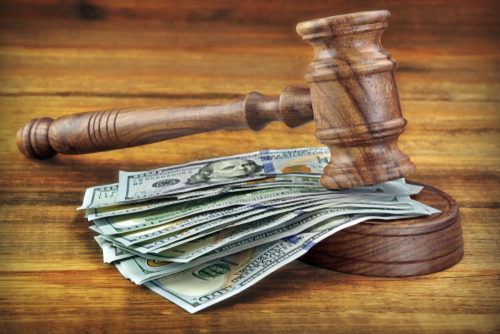Election lawyers say they can't be sanctioned if they signed documents in typewritten form

Image from Shutterstock.com.
Lawyers opposing Detroit’s bid for sanctions in Michigan election litigation argue that they can’t be held accountable if they signed the pleadings in typewritten form.
Detroit wants sanctions imposed on several lawyers, including L. Lin Wood Jr. and Sidney Powell, for alleged frivolous claims in a suit challenging Michigan election results. Michigan officials support the bid, according to the Detroit News.
In a Jan. 19 legal filing, the lawyers explained their opposition to Detroit’s motion, Law360 reports.
Detroit sought sanctions under Rule 11 of the Federal Rules of Civil Procedure and requested that the lawyers be referred to state disciplinary authorities for action, according to prior coverage by Law360 and Forbes.
Detroit had argued that “a dark strain of paranoia” infected the election lawsuit.
“While the First Amendment may protect the right of political fanatics to spew their lies and unhinged conspiracy theories, it does not grant anyone a license to abuse our courts for purposes which are antithetical to our democracy and to our judicial system,” the city wrote.
The lawyers opposing sanctions argued that:
• There should be no sanctions against lawyers who didn’t formally appear in the case or sign pleadings. In some instances, Powell used “/s/ Sidney Powell” as her typewritten signature, according to Law360. “Typewritten name is not signature for purpose of Rule 11, and therefore senior partner of law firm which represented defendants and whose name was typed on pleadings but who did not personally sign them is not subject to Rule 11 sanctions,” the response says.
• The sanctions motion included a request for referrals to bar disciplinary authorities, violating a requirement that a Rule 11 sanctions motion be filed separately from other motions. Detroit “filed its specious motion in its own improper effort to promote its own agenda with the media and to distract from explosive evidence of voter fraud,” the response says.
• Detroit’s notice of its sanctions bid, served on the lawyers Dec. 15, didn’t have specific details of wrongdoing. As a result, the notice didn’t satisfy the requirement that lawyers subjected to a sanctions bid be given 21 days to withdraw frivolous claims. Detroit’s sanctions motion was filed Jan. 5, and the plaintiffs moved to drop the case Jan. 14.
• Detroit made ”outrageous and unprofessional allegations” that the plaintiffs’ lawyers lied to the court just because they offered expert reports that were disputed before they could be developed in discovery. “Proffering expert reports that are disputed by plaintiffs’ experts does not make counsel liars,” the lawyers say.
• The election lawsuit was not filed for purposes of harassment or other improper motive, and the claims were not “debunked” because there was no evidentiary hearing.



